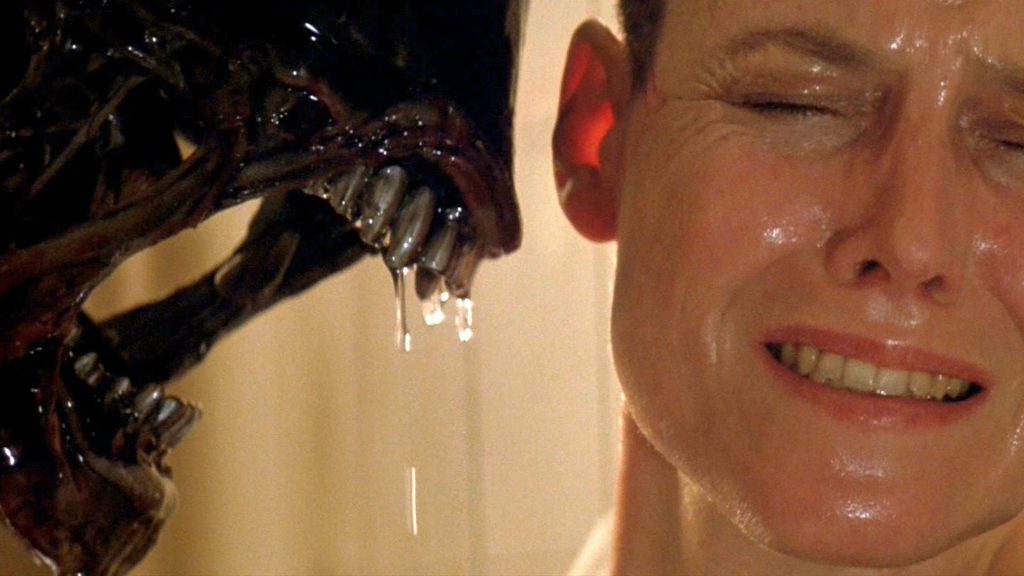Trilogy Anatomy: Alien 3, by Tober Corrigan
17 Jun
Upon being asked after the release of the Dark Knight if he had a third installment planned, Christopher Nolan replied with asking ironically how many good third movies there were. Of course, Nolan eventually did complete his trilogy, whether it being against his better judgment or not depending on who one talks to. Throughout movie history, the essential functions of the third film in a series have either been as a fitting and satisfactory end to a particular storyline (Lord of the Rings: Return of the King), a disappointing but nevertheless conclusive entry (Godfather III), or a debacle so big as to necessitate a reset to the franchise (Superman III/Spiderman 3, etc., etc.). In anticipation of another highly-anticipated third film, War for the Planet of the Apes, this weekly series will cover famous third films, infamous third films and otherwise, exploring how trilogy-enders or other types of third films have functioned in relation to its series.
If you turn your head and squint just right, the first three films in the Alien series make for a finely-tuned trilogy. Each one builds on the previous’ mythos, adding subtle shadings to the portrait without giving away all the secrets. The three together play out the same basic story structure while also riffing on the series’ themes. The third film’s ending feels definitive, with a key character decision that completes, or ends, the previous film’s vicious cycles. And yet, somehow, Alien, Aliens, and Alien 3 could not be a more atonal trio.
The main tension behind David Fincher’s 1992 fiasco/subversive masterwork is between its insistence on deriving narrative and emotional power from James Cameron’s Aliens, which it takes place directly after, and its equal insistence to be a film experience far apart from Cameron’s sequel. The film’s decision to do away with two (technically three, except an android gets a brief return) of the second film’s more beloved characters all in the opening credits shows the little shame it feels in abandoning the previous sequel’s sentimentality. But the next two hours deal in large with the fallout of these deaths, obsessing over Ripley’s inability to cope with the piling casualties. Since I find one of the trilogy’s overarching motifs, that of Ripley’s struggles with grief and loss, to be mostly misguided and overblown, Alien 3 simultaneously intrigues and annoys in its treatment.
Alien 3 is peak 90s Fincher, in the same way Aliens is Cameron at his 80s pop-corniest, and the original Alien at Ridley Scott’s most New Hollywood. All three films are very in tune with the time in which they were made, which perhaps explains the great disparities in style. In Alien, silent, steady camera work is the judge, jury, and executioner of the plot. Mood and atmosphere are practically an extra member. Kubrick-ian exactitude collide with a Star Wars-induced capacity for wonder. Absence becomes 100 minutes of dreadful presence. Then Aliens blows that all away quite literally, intent on being a fast-paced, stake-raising, action war flick, afraid to even sneeze without consulting Joseph Campbell’s The Hero’s Journey first. The composition, acting, character development, and music all work together for a serviceable and bland effort; it hits too many of the right buttons in all the obvious ways.
Then comes Alien 3 to grime it all up. Fincher’s cinematic sensibilities are dialed up to 11 here, mixing German expressionist lighting with a Soviet eye for composition. The body horror later perfected in Seven gets a meaty test run. Out of the three, Alien 3 can certainly be deemed the most “directed” film. As a result, stylistic consistency rules over narrative cohesion. Though even in the visual department, the cinematographer and VFX effects artists take some weird chances, the Alien POV shots in the film’s final, very confusing chase scene being the worst of them. And yet the cheapness of the digital Alien running or the very fake fire around Ripley during her final sacrifice help offset the pervasive self-seriousness.
The grit and melancholy are committed, but lose some of the expected impact due to a gallery’s row of disposable side characters and a final third that at times bores and at other times baffles. Though I wouldn’t say Aliens had much going for it in the way of good characters, Alien 3 decides to only half-learn from its previous film’s mistakes. Aliens suffers from trying to make its audience like its characters too much. The late Bill Paxton’s silly character remains only that throughout, no matter how many close-ups he’s given. The little girl character, Newt, is clearly, as Gene Siskel noted in one of the film’s only negative reviews, meant to turn up the sentiment and the scares without having to really earn anything. Alien 3 decides to make all characters despicable (at least on the surface) by forcing Ripley to live alongside convicts with the dirtiest of records. Some shoehorned business about the men converting to a religious cult of their own making is meant to complicate our understanding of who the men are and aren’t, but in this age of prison dramas and court procedurals, the material feels tired and tiring. The more the supporting cast gets involved in the plot’s machinations, the more unfocused that plot ultimately becomes.
Alien 3 gets noteworthy when dealing with the most satisfying through line of Ripley’s journey through the series: a woman’s ongoing struggle against being silenced or deemed crazy by male counterparts. This theme only gets more explicit with each film; thankfully Fincher and crew pick up the cue and decide to go heavy with it. Alien, a film pretty bare on story, makes Ripley’s oppression mostly a matter of logistics. Her orders to not board the ship after encountering the colony are ignored, catalyzing the drama of the next three films and beyond. Only with the picking off one by one of the ship’s crew is Ripley allowed to be heard, namely because no one else is alive to listen. By Aliens she is up against the bureaucracy of the system, attempting to legitimize her sanity in a world of yes-men and know-it-all higher ups. With the deaths of everyone she knows at the beginning of Alien 3, she is forced to once again be silenced about the tragedies she has been through. Yet, Ripley proves more cunning than ever before in the face of systematic oppression, intentionally silencing herself at first for the sake of her own survival. In Alien 3, Ripley is dominating when she needs to be but otherwise carries a quiet strength. It’s the best Sigourney Weaver performance of the three in large part due to the range the film demands of her. And finally, finally, we get the manic theatricality her character always deserved, one denied her by Cameron and not conceivable within Scott’s universe.
No matter the consensus on Ripley’s final choice in Alien 3, it sure does put an end to things. Even better, the ending offers closure with many layers. The Alien vs. Human struggle has always been the central intrigue for this trilogy, but I find Ripley’s ongoing dynamics with the Weyland-Yutani corporation to be just as entertaining. Like a game of never-ending tag, the two tried to catch each other and obliterate the motivations therein. In Alien 3, Ripley gets the final word, forever denying Weyland-Yutani the race of aliens they wish to exploit. Before she does, they tempt her with the chance to learn the full truth about, well, everything behind the curtain of these three movies. And yet she brazenly rejects that knowledge, shows no need for it anymore, and in so doing guarantees that no one but the voyeurs in seats for all three films would ever have access to the full truth about Ripley. Alien 3 ends with the audio report Ripley gives at the end of Alien. She calls herself the last survivor of the Nostromo. But she wasn’t. We were.





No comments yet